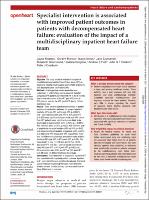Por favor, use este identificador para citar o enlazar este ítem:
https://repositorio.usj.es/handle/123456789/252
Registro completo de metadatos
| Campo DC | Valor | Lengua/Idioma |
|---|---|---|
| dc.contributor.author | Antón-Solanas, Isabel | - |
| dc.date.accessioned | 2019-12-05T19:10:57Z | - |
| dc.date.available | 2019-12-05T19:10:57Z | - |
| dc.date.issued | 2017-03-08 | - |
| dc.identifier.citation | Masters J, Morton G, Anton I, et al. Specialist intervention is associated with improved patient outcomes in patients with decompensated heart failure: evaluation of the impact of a multidisciplinary inpatient heart failure team. Open Heart2017;1:e000547. doi:10.1136/openhrt-2016-00054 | es_ES |
| dc.identifier.issn | 2053-3624 | es_ES |
| dc.identifier.uri | https://repositorio.usj.es/handle/123456789/252 | - |
| dc.description.abstract | ObjectiveThe study aimed to evaluate the impact of a multidisciplinary inpatient heart failure team (HFT) on treatment, hospital readmissions and mortality of patients with decompensated heart failure (HF).MethodsA retrospective service evaluation was undertaken in a UK tertiary centre university hospital comparing 196 patients admitted with HF in the 6 months prior to the introduction of the HFT (pre-HFT) with all 211 patients seen by the HFT (post-HFT) during its first operational year.ResultsThere were no significant differences in patient baseline characteristics between the groups. Inpatient mortality (22% pre-HFT vs 6% post-HFT; p<0.0001) and 1-year mortality (43% pre-HFT vs 27% post-HFT; p=0.001) were significantly lower in the post-HFT cohort. Post-HFT patients were significantly more likely to be discharged on loop diuretics (84% vs 98%; p=<0.0001), ACE inhibitors (65% vs 76%; p=0.02), ACE inhibitors and/or angiotensin receptor blockers (83% vs 91%; p=0.02), and mineralocorticoid receptor antagonists (44% vs 68%; p<0.0001) pre-HFT versus post-HFT, respectively. There was no difference in discharge prescription rates of beta-blockers (59% pre-HFT vs 63% post-HFT; p=0.45).The mean length of stay (17±19 days pre-HFT vs 19±18 days post-HFT; p=0.06), 1-year all-cause readmission rates (46% pre-HFT vs 47% post-HFT; p=0.82) and HF readmission rates (28% pre-HFT vs 20% post-HFT; p=0.09) were not different between the groups.ConclusionsThe introduction of a specialist inpatient HFT was associated with improved patient outcome. Inpatient and 1-year mortality were significantly reduced. Improved use of evidence-based drug therapies, more intensive diuretic use and multidisciplinary care may contribute to these differences in outcom | es_ES |
| dc.format.extent | 7 p. | es_ES |
| dc.format.mimetype | application/pdf | es_ES |
| dc.language.iso | eng | es_ES |
| dc.publisher | British Cardiovascular Society | es_ES |
| dc.rights | Attribution-NonCommercial-NoDerivatives 4.0 Internacional | * |
| dc.rights.uri | http://creativecommons.org/licenses/by-nc-nd/4.0/ | * |
| dc.title | Specialist intervention is associated with improved patient outcomes in patients with decompensated heart failure: evaluation of the impact of a multidisciplinary inpatient heart failure team | es_ES |
| dc.type | journal article | es_ES |
| dc.subject.unesco | Sistema cardiovascular | es_ES |
| dc.identifier.doi | 10.1136/openhrt-2016-00054 | es_ES |
| dc.rights.accessRights | open access | es_ES |
| Aparece en las colecciones: | Artículos de revistas | |
Ficheros en este ítem:
| Fichero | Descripción | Tamaño | Formato | |
|---|---|---|---|---|
| e000547.full.pdf | 600,29 kB | Adobe PDF |  Visualizar/Abrir |
Este ítem está sujeto a una licencia Creative Commons Licencia Creative Commons

